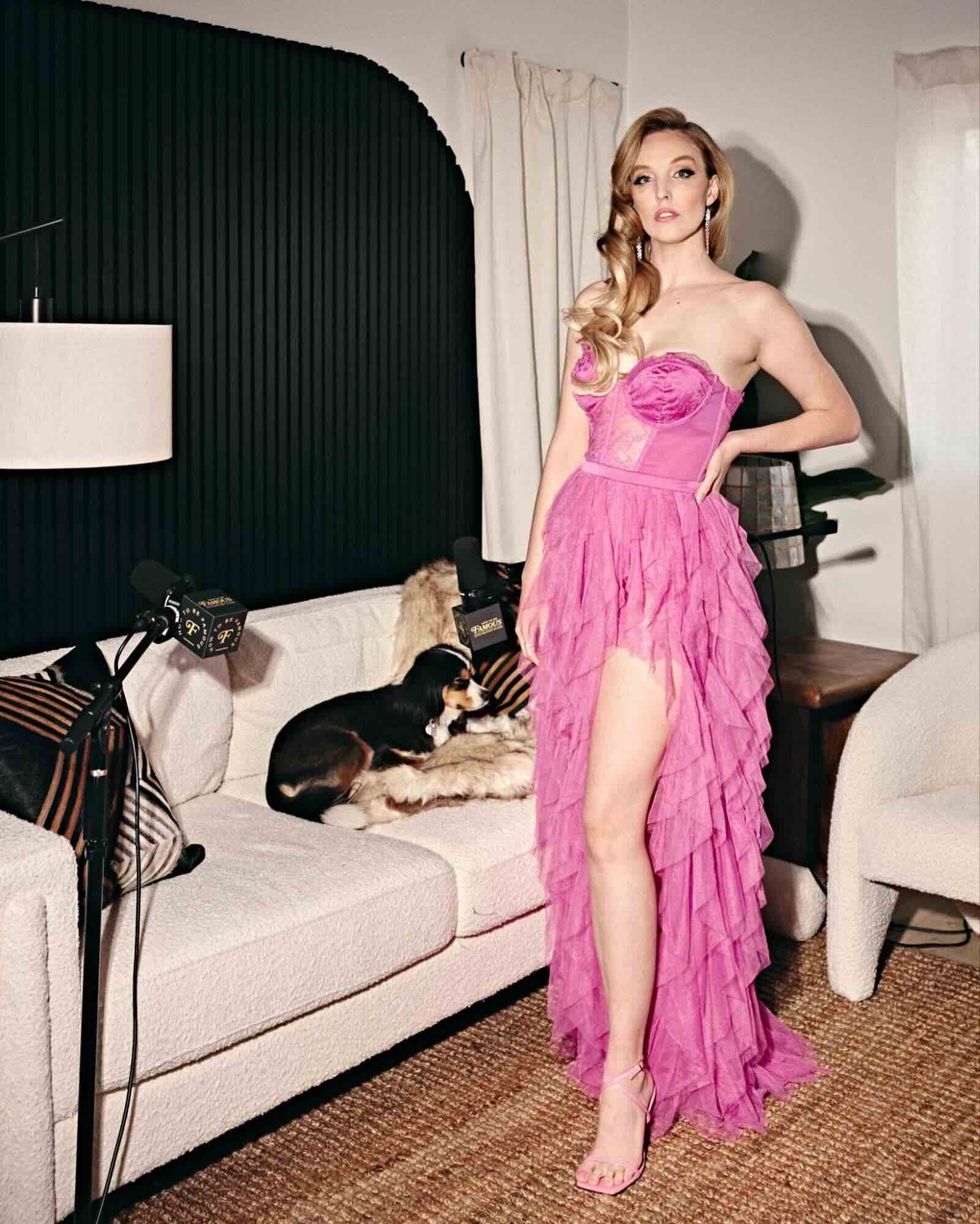
As Hollywood’s old machine sputters and collapses, Whitney Uland is stepping in to rewrite the rules. An award-winning filmmaker, coach, and actor, Whitney isn’t just navigating the chaos—she’s thriving in it, reshaping the industry from the ground up. In the last 18 months alone, she’s generated over $1 million in sales from her coaching platform and subscription-based content, building an empire that connects directly with audiences and prepares talent to thrive in the ever-shifting landscape of modern fame.
This isn’t influencer marketing or quick-hit brand deals—it’s something much bigger. Whitney is proving that the future of Hollywood belongs to creators who understand both the timeless art of storytelling and the modern demands of digital consumption. She’s blending short-form precision with long-form mastery, turning chaos into opportunity and positioning herself as a leader of the industry’s next evolution.
Hollywood’s Next Power Player
Whitney’s rise to fame reads like a Hollywood script of its own. She was on the brink of a major breakthrough—her career gaining momentum, a development deal in motion, and her foot firmly in Hollywood’s door. Then, like so many artists, she watched it all unravel.
When the pandemic hit, production halted overnight. Her agent was furloughed, funding for her film disappeared, and the industry that had been working in her favor came to a standstill. At the same time, her personal life took an unexpected turn—she became pregnant, went through a divorce, and suddenly found herself navigating single motherhood while her career was on pause.
Rather than waiting for Hollywood to recover, Whitney built something new. She launched How to Be Famous, a coaching platform designed to teach actors and creators how to break into the industry on their terms. Instead of relying on outdated industry rules, she’s helping a new wave of talent leverage digital platforms, build credibility, and create long-term, sustainable careers.
Whitney’s clients are dominating platforms like Netflix, Disney+, and Showtime—not because they fit the traditional mold of a star, but because she’s taught them how to rewrite the rules. “Hollywood isn’t about waiting to be chosen anymore,” Whitney explains. “It’s about creating your own opportunities, building your audience, and showing the industry that you already have what they’re looking for.”

Mastering the Short Game for the Long Game
Steven Zeitchik of The Hollywood Reporter recently captured the essence of today’s content economy: “What Netflix had once done to Hollywood—using algorithms to make video irresistible—TikTok has done to Netflix. Likely permanently.” The shift from polished, long-form storytelling to short, engaging clips has left traditional Hollywood scrambling to catch up.
Whitney, however, has mastered this evolution. Her short-form videos—authentic, magnetic, and algorithm-friendly—don’t just entertain; they convert. In just 18 months, she’s built a million-dollar business from her content, proving her ability to engage audiences in ways that the old Hollywood machine simply can’t replicate.
“Short-form content isn’t just about quick dopamine hits,” Whitney explains. “It’s about understanding what resonates and why. If you can master that, you can translate it into anything—whether it’s a 20-second clip or a full-length film.”
Whitney’s understanding of these consumption habits positions her uniquely to bridge the gap between TikTok’s bite-sized brilliance and Hollywood’s long-form legacy. She isn’t just riding the wave of change—she’s steering it.
The Hollywood Crisis
The traditional Hollywood machine is crumbling under the weight of its own dysfunction. Diddy’s explosive legal battles, including allegations of obstruction of justice, have reignited discussions about the unchecked power wielded by industry elites. As Candace Owens boldly pointed out, these accusations shine a light on the culture of impunity that has enabled such behavior for decades. Meanwhile, the brewing tension behind Blake Lively and Justin Baldoni’s It Ends With Usadaptation—a project embroiled in lawsuits over toxic work allegations, creative clashes, and wrongful termination—reveals an industry plagued by discord even at its highest levels. Together, these scandals don’t just expose cracks in the system—they highlight a Hollywood unraveling at its core.
While Hollywood’s traditional players struggle to keep up, Whitney is already thriving in the new order. Her approach isn’t just about survival—it’s about reinvention. By blending her expertise as an award-winning filmmaker with her transformative coaching methods, Whitney is creating a pipeline of talent equipped to handle the pressures of fame and the demands of an evolving industry. In a world where chaos reigns, she’s not just building stars—she’s building stability, proving that the future of Hollywood belongs to those who dare to rewrite the script.
Now, after reshaping the industry from behind the scenes, Whitney is stepping back in front of the camera—this time, not just as a coach, but as an actor reclaiming her career. She’s not just picking up where she left off—she’s returning with more power, more control, and more influence than ever before.
And the results speak for themselves. Whitney’s clients are landing major roles on the likes of Hulu, HBO and Comedy Central, captivating audiences and building loyal followings. They’re not just booking gigs—they’re becoming forces in their own right, redefining what it means to be a star in the digital age. Whitney’s work isn’t about simply navigating Hollywood’s collapse; it’s about creating the blueprint for what comes next, one breakthrough at a time.

Playing the Long Game
"Despite her success, Whitney isn’t rushing to partner with Hollywood’s old guard. “I’ve built something sustainable,” she says. “The partnerships I consider need to align with that sustainability.” That same mindset applies to her own career—returning to acting on her terms, she’s choosing roles that align with her long-term vision rather than chasing short-lived opportunities."
This isn’t arrogance—it’s strategy. Whitney knows the value of what she’s created, and she’s not willing to give a piece of it away without a compelling reason. That confidence has made her one of the most intriguing figures in Hollywood’s new landscape—a creator who doesn’t just understand the future but is actively building it.
Hollywood’s Future Belongs to Innovators
As Steven Zeitchik observed, “Video consumption now looks nothing like it did five years ago, just as video consumption in 2030 will itself be unrecognizable to our present selves.” The future of entertainment belongs to creators who can adapt, innovate, and connect—Whitney Uland is doing all three.
With a proven ability to captivate audiences, generate revenue, and mentor the next generation of stars, Whitney is setting a new standard for what it means to be a creative powerhouse. In an industry desperate for reinvention, she isn’t just navigating the chaos—she’s building a new kind of Hollywood, one where creators hold the keys to their own destinies.

Image credit: Gabriele Di Martino
ATF Story
Madison Beer, Her Way
Photography by Davis Bates / Story by Alaska Riley
Photography by Davis Bates / Story by Alaska Riley
16 January
Entertainment
Cynthia Erivo in Full Bloom
Photography by David LaChapelle / Story by Joan Summers / Styling by Jason Bolden / Makeup by Joanna Simkim / Nails by Shea Osei
Photography by David LaChapelle / Story by Joan Summers / Styling by Jason Bolden / Makeup by Joanna Simkim / Nails by Shea Osei
01 December
Entertainment
Rami Malek Is Certifiably Unserious
Story by Joan Summers / Photography by Adam Powell
Story by Joan Summers / Photography by Adam Powell
14 November
Music
Janelle Monáe, HalloQueen
Story by Ivan Guzman / Photography by Pol Kurucz/ Styling by Alexandra Mandelkorn/ Hair by Nikki Nelms/ Makeup by Sasha Glasser/ Nails by Juan Alvear/ Set design by Krystall Schott
Story by Ivan Guzman / Photography by Pol Kurucz/ Styling by Alexandra Mandelkorn/ Hair by Nikki Nelms/ Makeup by Sasha Glasser/ Nails by Juan Alvear/ Set design by Krystall Schott
27 October
Music
You Don’t Move Cardi B
Story by Erica Campbell / Photography by Jora Frantzis / Styling by Kollin Carter/ Hair by Tokyo Stylez/ Makeup by Erika LaPearl/ Nails by Coca Nguyen/ Set design by Allegra Peyton
Story by Erica Campbell / Photography by Jora Frantzis / Styling by Kollin Carter/ Hair by Tokyo Stylez/ Makeup by Erika LaPearl/ Nails by Coca Nguyen/ Set design by Allegra Peyton
14 October




